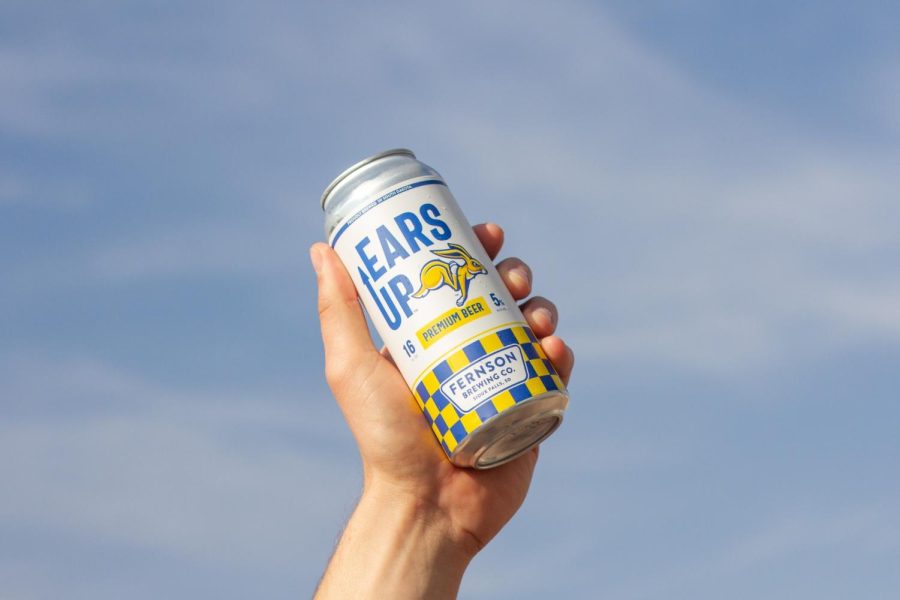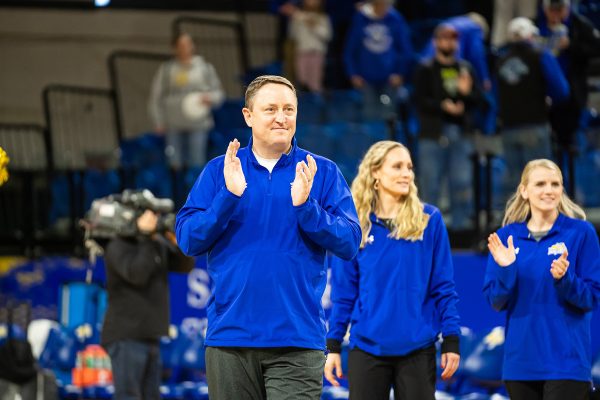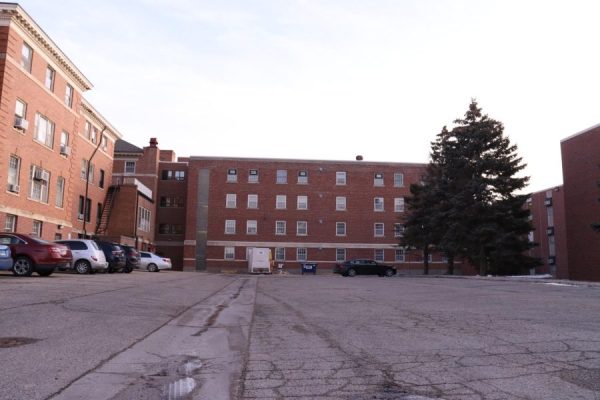Ears Up beer debuts to rapid sales
Fernson Brewing partners with university to create Jackrabbit-brand alcohol
October 25, 2022
If Tuesday’s debut of Ears Up beer is any indication, sales of Fernson’s new brew are going to be as fast as a jackrabbit.
Fernson Brewing, a Sioux Falls company, has partnered with South Dakota State University to create the beer centered around the Jackrabbits brand. Blake Thompson and Derek Fernholz, co-founders of Fernson, have been working with SDSU officials for about two years and the beer became officially available Tuesday in Brookings and Sioux Falls.
But it wasn’t available for long in most places.
“We sold out pretty dang quick,” Thompson said Tuesday afternoon. “It’s the fastest we’ve ever sold beer before.”
The company brewed what Thompson described as 90 barrels of beer and then put it in cans and 5- and 15-gallon kegs. By Tuesday afternoon, indications were that almost all of the 13,000 cans of beer were gone off the shelves, Thompson said.
People who want to sample the beer likely can find some at certain bars that still have some in their kegs, Thompson said. And, there have been some cans sent to Dana J. Dykhouse Stadium for Saturday’s Hobo Day game against Indiana State.
“But I assume we’ll be sold out of everything by the end of the weekend,” Thompson said.
The Brookings Municipal Liquor Store also sold out of the beer on Tuesday. Manager Bill Heldt said he had a line of people waiting at the door when the store opened at 9 a.m. They limited sales to two per customer.
“We put the beer out at 11:45 (a.m.) and it was gone at 1 (p.m.),” said Heldt, who did not want to give specific sales numbers. “It was gone in under two hours. We’re supposed to get more cases tomorrow.”
Derek Peterson, SDSU’s assistant vice president for business services, said Ears Up provides an opportunity to expand what he calls an already strong SDSU brand. He added that university officials are excited not only for this opportunity but other potential opportunities in the future.
“We are very fortunate to have a partner like Fernson and the opportunity to utilize its expertise, not only to create a tremendous product, but also to help market it and expand its reach to all corners of the state,” Peterson said in a statement.
The idea for the beer originated with Ben Lucas, a former SDSU official. He already had previous success with a similar project, creating another college beer for the “Old Aggies” of the University of Colorado. Fernholz, a 2008 graduate of SDSU, said that although Lucas was credited with coming up with the idea, the details and logistics were a collaborative effort.
While Ears Up became available in the Brookings and Sioux Falls market Tuesday, the rollout will expand throughout the state next week. The beer will be available in places such as Rapid City and the Black Hills region, Mitchell, Watertown, Huron, Aberdeen and Pierre, according to Thompson.
“Luckily, we have a lot more in the fermenters and it will be ready to go pretty soon,” Thompson said.
The beer will also be available at Dykhouse Stadium for the rest of football season and at Frost Arena during winter sports.
Fernholz describes Ears Up as a light beer similar to Grain Belt premium but with 5% alcohol by volume. The beer comes in a four-pack of 16-ounce cans and is expected to sell between $9 to $11, depending on distributors, Fernholz said.
According to what he has heard from distributors, Fernholz says they expect to have a large demand for the beer. He hopes that the demand is big enough to create a permanent market.
Ears Up is currently under contract to be readily available until the end of basketball season in March, with no guarantees of reupping the contract. But Fernholz said he thinks that the Jackrabbit fanbase is large enough to support the beer.
“There’s just so many people who love their Jackrabbits,” Fernholz said.
Thompson and Fernholz started their production brewery, Fernson Brewing, in 2015 in Sioux Falls. The company has since increased its distribution footprint into four states: South Dakota, North Dakota, Minnesota and Iowa.
“We cannot wait to see how this project grows and evolves for years to come,” Fernholz said.

























